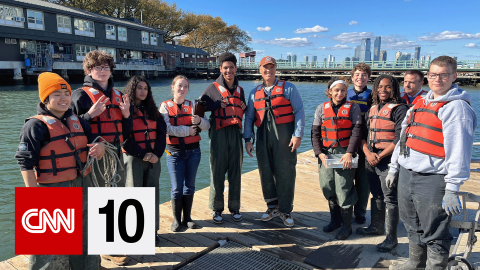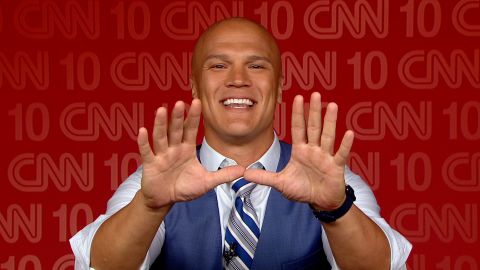Today's Show Transcript
DR. SANJAY GUPTA, CNN 10 ANCHOR: Hey, everybody. Happy Friday. You made it. We made it. I'm Dr. Sanjay Gupta and for Coy Wire. Coy and I look exactly the same except for I got some hair.
Look, I just got back from the dentist. As it turns out, even doctors can get cavities. Can you believe it? So, let this be a reminder not to eat too much candy and make sure to brush and floss twice a day.
I'm excited to spend part of my Friday with you, so let's get you your 10 minutes of news.
We start with an update on the ongoing federal government shutdown and the big impact it could have on air travel this weekend. President Donald Trump's administration says it's planning to cut flights in at least 40 of the nation's busiest airports starting as soon as today if the government shutdown does not end.
Transportation Secretary Sean Duffy said that means 10% of traffic could be cut, though it's still unknown which airports would be impacted. Duffy says the decision was made to keep, quote, "the airspace safe" amid the staffing shortages.
And now to an update on the deadliest typhoon to hit Asia so far this year, Typhoon Kalmaegi. The storm made landfall in central Vietnam yesterday with conditions equivalent to a Category 3 hurricane. That means there were winds of up to 125 miles an hour. It's the strongest storm on record to hit that part of the country, which, by the way, is still recovering from severe flooding and landslides caused by weeks of record rainfall.
The storm also left at least 114 people dead and more than 120 missing after tearing through the Philippines earlier this week. President Ferdinand Marcos Jr. has declared a state of national calamity there and promised to continue relief and response operations.
OK, time for 10-second trivia.
What does REM, or R-E-M, stand for?
Really exciting moments, rapid eye movement, relaxing energy medium, restful euphoria measurement.
Now, if you said rapid eye movement, that means you can do this in your sleep. The REM stage features darting eye movements, heightened brain activity, and vivid dreaming. Speaking of dreams, have you ever wondered if it's possible to control your dreams? A technique known as lucid dreaming aims to help people do just that.
And our Maya Blackstone put the process to the test, working in her sleep, to see if she could pull it off. Take a look.
(BEGIN VIDEO CLIP)
DANIEL LOVE, LUCID DREAMING COACH: Lucid dreaming, it's quite straightforward, really. It's a dream when you know that you're dreaming.
MAYA BLACKSTONE, CNN PRODUCER: I took a 19-day intensive course with this expert to learn how to trigger a lucid dream.
My mom died when I was a teenager after a long battle with ovarian cancer. Now, that I've gotten older, it's hard to even remember what her voice sounds like. When I heard about lucid dreaming, my first thought was, could I see my mom again?
So, today is the first day I'm trying your lucid dreaming course. What advice do you have for me?
LOVE: We're so used to being awake that we just assume all the time, of course I'm awake. Is this a dream? That question needs to become a major part of your thinking. Without that, there will be no lucid dreaming.
BLACKSTONE: Dreams feel real while we're dreaming. So, the idea is to constantly question my reality, to ask myself, am I dreaming? So, when I ask myself this while dreaming, I'll realize I'm actually asleep. Then I'll be able to consciously interact with and perhaps control my dream world.
LOVE: If you want to dream of a dead loved one, that is possible. If we can get you lucid, then we will start to nudge you in that direction so you can have that experience.
BLACKSTONE: I watched daily tutorials and kept a dream journal, and each morning I would dutifully record video diaries of my dreams.
It's day one.
The moment I woke up.
Day three.
Five.
Good morning.
Day eleven.
What do you think are some of the therapeutic benefits of lucid dreaming?
UNIDENTIFIED MALE: One of the benefits that we've looked at is a counter practice for nightmares. They could decide to wake up if they're lucid, and they can say, I realize this is a dream. Other people want to use their lucid dreams for spiritual development, perhaps unlocks your creativity.
There are others that may want to practice certain skills, a musical skill, something you're already really good at, perhaps like in slow motion or analyzing in a different way. We're in an early stage of the science.
BLACKSTONE: About two weeks into the course, I wasn't getting the results I thought I would. So, I checked in more.
It's 4:30 in the morning.
He called me in the middle of the night to interrupt my sleep mid cycle to help prompt a lucid dream.
LOVE: We're waking you up for a very brief amount of time just to give you a little bit of mental clarity.
BLACKSTONE: It was a real breakthrough.
OK, so I just woke up. I recognized I was dreaming. I was lucid. I was like driving and then I was like, okay, drive up this wall and drive down this wall and drive over here to this mountain.
It works. And I had an even more intense lucid dream a few days later.
Basically, I was in an elevator. I'm like, oh, I'm dreaming because this is what Daniel and I practice.
So, I was like, my like, press all buttons on the elevator. Not very interesting. And then I think I got to -- got to one of the floors and then woke up.
Truthfully, this wasn't quite the lucid dreaming experience I expected. I was able to make decisions in my dream world, but I didn't have full control. It was interesting and valuable, but I would have loved to say the doors opened and she was there.
LOVE: But you did that in a creation of a world that was in your own mind.
BLACKSTONE: That's true.
(END VIDEOTAPE)
GUPTA: This week, we've been asking you to submit any questions you might have about the brain and neurosurgery. I got to tell you, we got triple the amount of submissions yesterday.
From Instagram, one of you asked, "How does technology and constant screen exposure affect developing brains?"
Well, we're still learning about this, but the biggest impact is likely happening to the youngest brains. Kids around one to two years old who spent one to four hours on a screen could have delayed speech, fine motor, and social skills.
Now, to be fair, that may be less about the screens and more about the fact that these kids aren't practicing those skills as much in the real world.
They also found that older children, they might have more difficulty in managing their emotions because they often turn to a screen instead of dealing with the problem at hand directly.
Finally, too much screen time can lead to people feeling isolated, sleeping less. Look, no doubt just about everyone is using one of these devices nowadays, but you have to know when to put it away.
From Ms. Brabham's class at Carolina Day School in Asheville, North Carolina, "How does the teenage brain work differently than an adult brain?"
Well, for starters, the adult brain is more developed than the teenage brain. So, what does that mean? Well, in the brain, you have gray matter and you have white matter. Gray matter is typically on the outside, white matter on the inside. Think of gray matter as the cities in a state and the white matter as the roads that connect those cities.
In older brains, those roads are better constructed and better insulated, which means they can transmit signals up to 100 times faster. Now, one of the biggest differences, though, probably lies in this area of the brain, the prefrontal and the frontal cortex. These are the last areas of the brain to fully form.
In fact, they're often still developing even into your mid-20s, and those areas are responsible for your judgment and your decision making. So, next time you make a bad decision, you can tell Ms. Brabham that it isn't your fault, but rather it's your underdeveloped frontal lobes.
Today's story getting a 10 out of 10, a retirement home for penguins. Seven aging penguins are getting the kind of special treatment we can all only hope for in our old age. And this guy is the inspiration for it all.
Lambert is a critically endangered African penguin living at the New England Aquarium in Boston. He started to lose his vision and was clearly slowing down at the ripe old age of 33, which, by the way, is actually a bit longer lifespan than penguins in the wild. Their new space, as you see there, is flatter. It's also separated from the rest of the 38-bird colony to avoid any territorial spats with aggressive youngsters.
It has this carpeted path down to the water. They're also getting extra checkups for all the usual aches and pains from old age. So, Lambert and his buddies still might not be able to fly, but at least they get to retire in style.
All right, superstars, let's get to your Friday shout out. Mr. Samuelson at Barnes County North Public School in Wimbledon, North Dakota. Thank you for being a loyal viewer of the show.
I hope you all have a fun, safe and fulfilling weekend. And remember, take care of those brains.
Coy will be back on Monday. We'll see you then. I'm Dr. Sanjay Gupta, and this is CNN 10.
CNN 10's Weekly News Quiz

 • Video 10:47Video CNN10 Can you learn to control your dreams? 10:47
• Video 10:47Video CNN10 Can you learn to control your dreams? 10:47 • Video 11:11Video CNN10 A musician plays the clarinet during her own brain surgery 11:11
• Video 11:11Video CNN10 A musician plays the clarinet during her own brain surgery 11:11 • Video 10:38Video CNN10 The world's largest archaeological museum opens in Egypt 10:38
• Video 10:38Video CNN10 The world's largest archaeological museum opens in Egypt 10:38 • Video 10:09Video CNN10 The courageous fight to save Albania's endangered sharks 10:09
• Video 10:09Video CNN10 The courageous fight to save Albania's endangered sharks 10:09 • Video 10:29Video CNN10 A secret tunnel beneath the heart of Rome 10:29
• Video 10:29Video CNN10 A secret tunnel beneath the heart of Rome 10:29 • Video 10:36Video CNN10 The centuries-old fashion inspiring Halloween's hottest costumes 10:36
• Video 10:36Video CNN10 The centuries-old fashion inspiring Halloween's hottest costumes 10:36 • Video 11:06Video CNN10 The high school connecting students with the sea 11:06
• Video 11:06Video CNN10 The high school connecting students with the sea 11:06 • Video 10:04Video CNN10 Hurricane Melissa makes landfall as "storm of the century" 10:04
• Video 10:04Video CNN10 Hurricane Melissa makes landfall as "storm of the century" 10:04 • Video 10:27Video CNN10 The truth behind your clothing’s ‘made in Guatemala’ label 10:27
• Video 10:27Video CNN10 The truth behind your clothing’s ‘made in Guatemala’ label 10:27





